A Quote by Timothy Geithner
The major economic policy challenges facing the nation today - pick your favorites among the usual suspects of low public and household savings, concerns about educational quality and achievement, high and rising income inequality, the large imbalances between our social insurance commitments and resources - are not about monetary policy.
Quote Topics
About
Achievement
Among
Between
Challenges
Commitments
Concerns
Economic
Economic Policy
Educational
Facing
Favorites
High
Household
Income
Income Inequality
Inequality
Insurance
Large
Low
Major
Monetary
Monetary Policy
Nation
Our
Pick
Policy
Public
Quality
Resources
Rising
Savings
Social
Suspects
Today
Usual
Your
Your Favorite
Related Quotes
The theory of economic shock therapy relies in part on the roleof expectations on feeding an inflationary process. Reining in inflation requires not only changing monetary policy but also changing the behavior of consumers, employers and workers. The role of a sudden, jarring policy shift is that it quickly alters expectations, signaling to the public that the rules of the game have changed dramatically - prices will not keep rising, nor will wages.
Think of a public library, worth more for those who cannot afford numerous books. Think of a public waterway or fishing ground. All types of commons have imputed monetary value that together comprise a source of social income. As such, the commons reduces economic inequality and insecurity in society.
The problem with much of the debate over this issue is that we confuse two separate matters: immigration policy (how many people we admit) and immigrant policy (how we treat people who are already here). What our nation needs is a pro-immigrant policy of low immigration. A pro-immigrant policy of low immigration can reconcile America's traditional welcome for newcomers with the troubling consequences of today's mass immigration. It would enable us to be faithful and wise stewards of America's interests while also showing immigrants the respect they deserve as future Americans.
Post-genocide Rwanda has managed to implement a good universal health insurance scheme that covers a large proportion of the population. This came about because of the severity of the country's problems and the resulting high proportion of women in the parliament and among professional caregivers, which had a positive effect on policy.
Social Security is an insurance policy. It's a terrible investment vehicle. Social Security has some great benefits. But it was never meant to be a savings plan. So we need to have a national debate. Should this 12.5 percent that we're contributing all go into a Social Security pool, or should half go into a mandatory savings plan?
































